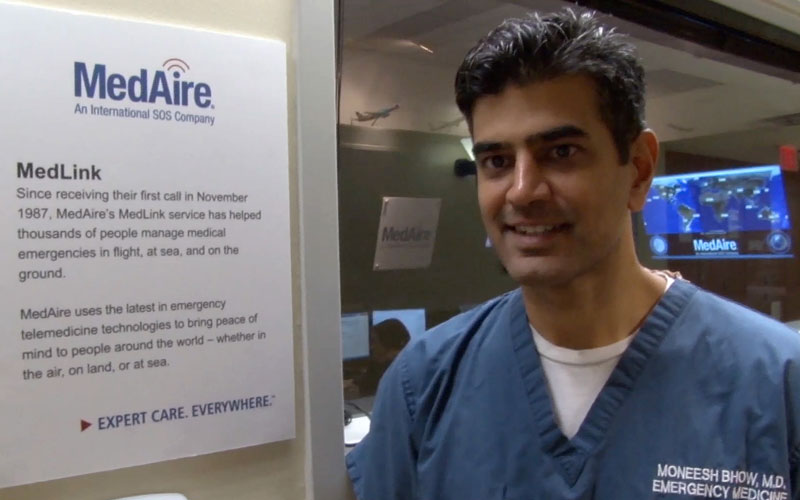
The Phoenix-based company receives calls during in-flight emergencies and walks callers through treatment so passengers can get to a hospital as soon as the flight lands. (Photo by Mitch Quesada/Cronkite News)
Flying thousands of miles above civilization may seem like a good reason to panic in the midst of a medical event, but MedAire Worldwide’s 24/7 remote medical assistance centers help passengers and airline employees cope during a crisis.
Paulo Alves, Global Medical Director of Aviation Health for MedAire Worldwide, says the Phoenix-based MedLink call center at Banner Health Good Samaritan Hospital is “a simple and well-oiled system” designed to analyze in-flight medical situations, evaluate the severity, and advise airline employees accordingly. Thus, reducing the necessity to divert planes for emergency landings.
“Our goal is to approach this problem of in-flight medical events from every possible angle,” he said.
In the past week, two airplanes have been diverted because of medical emergencies in the cockpit. An American Airlines pilot died midflight on the way to Boston and a United co-pilot lost consciousness on a flight to California.
Dr. Moneesh Bhow, an emergency physician at Banner Health, said in the case of a medical event, captains and flight attendants can call the center and get in direct contact with a Banner Health emergency physician.
“The call will come into our center over here, the call will be answered by one of our communications specialists who will take some basic information down, and then a physician will eventually give us further information about the case,” he said. The center receives about 200 calls per day, Bhow said.
All MedLink communications specialists, including roughly 45 emergency physicians, are trained in aviation-specific protocols such as airline operations and altitude physiology.
Julia Thorn, manager of marketing and corporate communications at MedAire Worldwide, said MedLink doctors provide the most current emergency medical knowledge.
“Their extensive experience in managing in-flight issues—combined with training in altitude physiology and airline operational concerns—means they bring unique expertise to the management of in-flight emergencies,” she said in an email.
Alves said MedAire provides information to flight attendants for all 120 participating airlines, in addition to their required first aid training. Hands-on practice for flight attendants enables them to be “better prepared to stabilize a situation and avoid complications from happening,” he said.